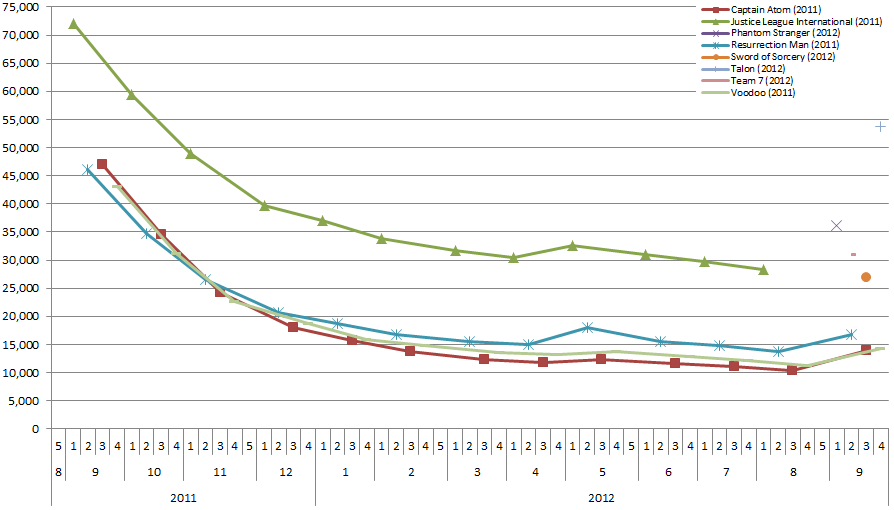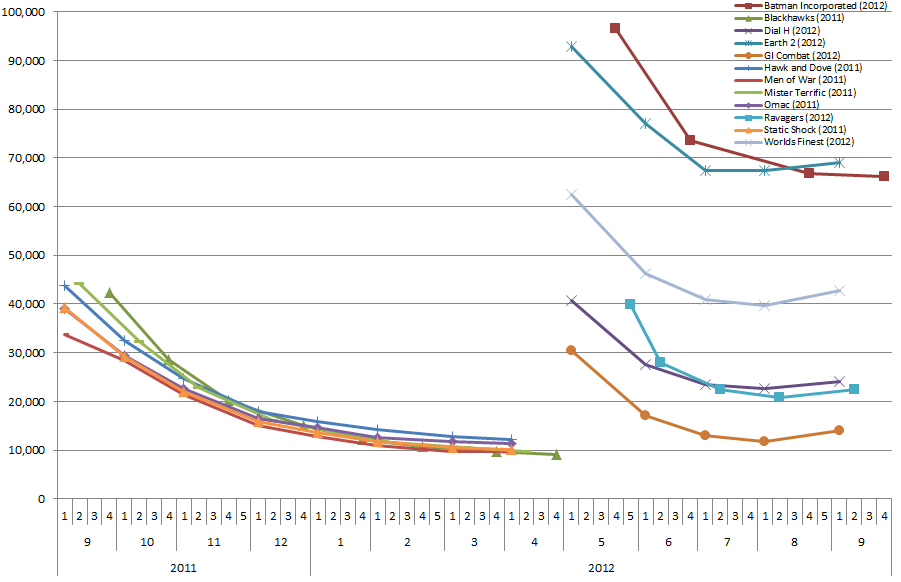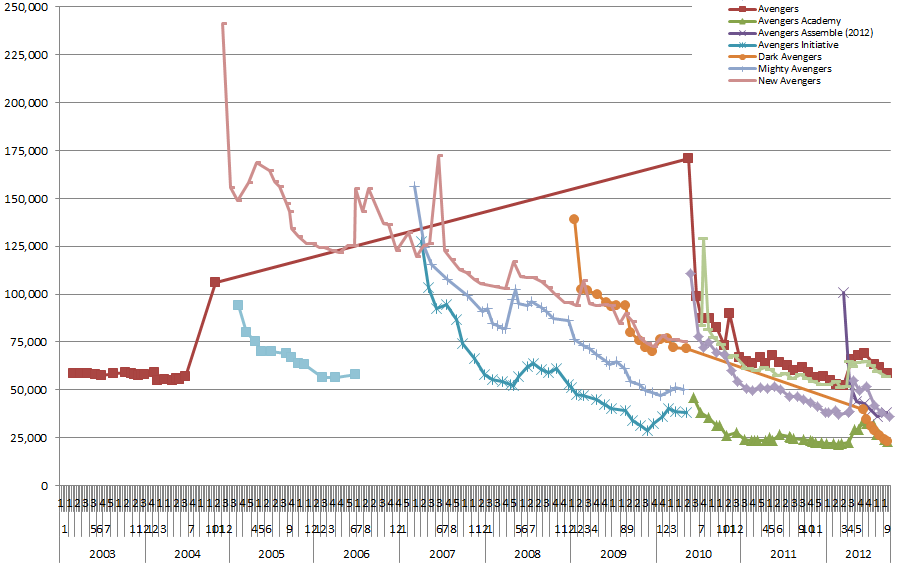Mayo Report for 2012-09

|

|
Top Comics List Top Comics Breakdown Top Trades List Top Trades Breakdown
September was a good month for DC which accounted for 43.14% of the total units sold for the top 300 comics. Marvel had 35.92% of unit sales. DC took nine of the top ten slots on the top comics list in September 2012 but Marvel retained the top slot with "Avengers vs X-Men" #11. Comics from DC were up an average of 7.65% while the comics from Marvel were down an average of 5%.
September was a turning point of sorts for the New 52 titles over at DC. It marked the end of a few titles and the start of the third wave of titles as the second year of the New 52 continuity began. While the zero issues interrupted a few storylines, the origin themed done-in-one issues did very well for DC. On average, sales were up around 14.25% on the zero issues. The net increase in sales of around 193,667 units means we are likely to see another such theme month at some point in the future. Maybe a month of issues with negative numbers featuring evil counterparts from a mirror universe? Or the arch enemy of the title character? Who knows what the next theme might be. A theme month once a year could work well for DC provided it is a good theme and doesn't interrupt ongoing storylines.
As should be expected, sales have declined on the New 52 titles over the course of the year but the line as a whole remains strong. The item count chart and this chart of the estimated units only include new items and do not include the reorder activity.
DC has been doing a good job of slowly rotating out the lower selling items and replacing them with additional titles. Here is a chart of the sales of "Captain Atom," "Voodoo," "Resurrection Man" and the initial issues of the Wave 3 titles "Talon," "Phantom Stranger," "Team 7" and "Sword of Sorcery."
The wisdom of this approach is made clear by comparing the estimated sales of the first group of titles to end and the estimated sales of the replacement titles.
"G.I. Combat" #7 was solicited as the final issue of that series. The other titles likely to get phased out soon are "Grifter," "Blue Beetle," "Fury of Firestorm, the Nuclear Men," "I, Vampire," "Frankenstein, Agent of S.H.A.D.E." and "Legion Lost." The other possible title is "DC Universe Presents" but it might be considered an exception case since it is a series of miniseries disguised as a series and one of the few vehicles for getting character into the market without devoting a series or miniseries to them.
September marked the first month in which more than 52 ongoing titles were released due to the overlap of the final issues of "Captain Atom," "Voodoo," "Resurrection Man" and the initial issues of the Wave 3 titles "Talon," "Phantom Stranger," "Team 7" and "Sword of Sorcery." There were a couple of Annuals released in some months such as August 2012 which increase the number of items released slightly.
DC has a number of crossover storylines coming up like "H'El on Earth" and "Death of the Family" as well as a few parallel stories under a single banner like the "Rotworld" storylines in "Animal Man," "Swamp Thing," and "Frankenstein, Agent of S.H.A.D.E." and the "Rise of the Third Army" storylines in the Green Lantern titles. These act as polarizing forces on readers and sales. Readers excited about the titles and stories are likely to get a few comics they might not otherwise have gotten. Readers not fully satisfied with the storylines or on a more restricted budget are likely to jump off titles as a result. Personally, I enjoyed the shared universe aspect of the comics by Marvel and DC but I also like each title to be self-sufficient. Given the sales bump from "The Night of Owls" storyline back in May, it seems like these crossover storylines are popular.
While the 169,530 estimates units for "Avengers vs X-Men" #11 are strong sales, the event series end with the next issue. With "Uncanny X-Men" #18 selling approximately 59,790 units and "Avengers" #30 around 58,605 units, Marvel needs this relaunch to place a few titles firmly near the top of the list. Neither the Avengers titles nor the X-Men titles are particularly strong right now.
Pulling back and taking a longer view at the two franchises shows how much they have dropped in sales over the years.
The Marvel Now will determine how Marvel does for the next year or two with "Uncanny Avengers" #1 the first indication of the success or failure of this repositioning of the Marvel Universe titles. The main challenge Marvel faces with the Marvel Now initiative is making it feel significantly more important than the last few waves of relaunches they have done. Many of the titles being replaced are only a year or two old. This rapid turnaround on titles gives the impression the promotion push of the day is just a fleeting thing and likely to be forgotten in a year or two.
Another challenge Marvel faces is sales resistance due to the price point and frequency of the titles. With DC still holding the line at $2.99, the $3.99 price on Marvel titles put those titles at a disadvantage. Compounding the financial burden is the double shipping on a significant number of Marvel titles. Retailers will need to order the majority of the first story arc on the Marvel Now titles before they have any idea how those titles are clicking with readers. Putting retailers into that position almost forces them to order conservatively on subsequent issues.
DC proved a major line wide relaunch can be successful and that success benefited the entire industry by getting more people into comic book stores. If Marvel can get lapsed Marvel fans back into the shops, we could see another resurgence of sales and interest in comics. Marvel Now will either be seen as the start of a bold new direction for the Marvel Universe or just another in the long line of frequent reshufflings of the Marvel creators, characters and titles.










